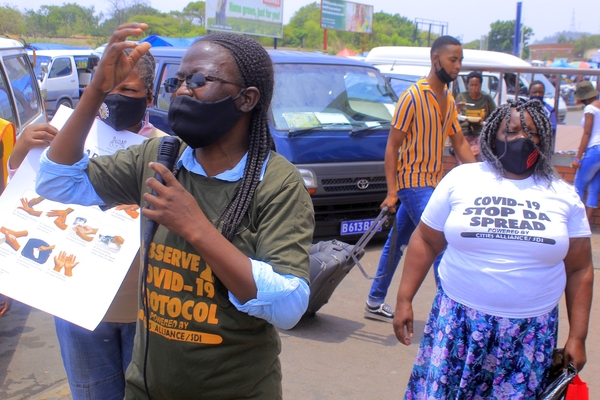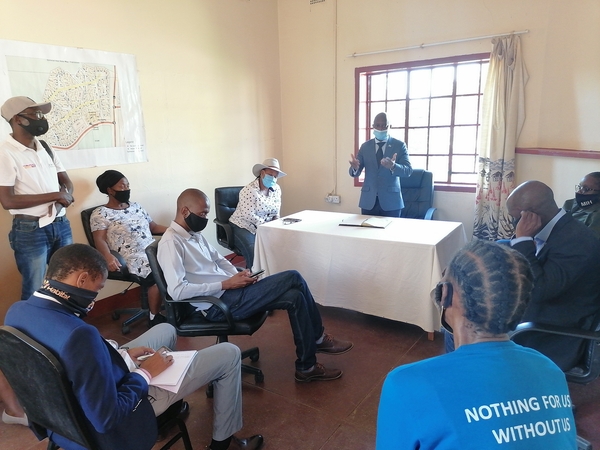- Who We Are
- How We Work
- Regional / Country Initiatives
- Legacy
- Core Themes
- Working Groups
- Portfolio & Results
- Newsroom
- Resources
Botswana: Building Resilient and Sustainable Communities and Livelihoods

Project Overview
Amidst pre-existing health issues, economic instability, and social disruptions in Botswana, the Covid-19 pandemic significantly worsened these challenges. As the government strives to allocate resources for recovery, The Trust for Community Initiatives (TCI), in collaboration with the Botswana Homeless and Poor People’s Federation, has played a pivotal role in bolstering community sustainability.
This project aims to nurture inclusive, resilient, and sustainable communities across six regions. It champions gender equality, raises community awareness, and prepares for the challenges of climate change through community symposiums and collaboration with stakeholders, including ward development committees and the Botswana Homeless and Poor People’s Federation.
This project is part of the Building Resilience in Informal Settlements Programme, a partnership between Cities Alliance and Slum Dwellers International (SDI), funded by the Swedish International Development Cooperation Agency (Sida), to support civil society organisations working in informal settlements.

Project Results: 2022-2024
The resilience of savings groups has been evident, with many nearing a return to pre-pandemic levels. The project has supported 2,145 savers across 51 savings groups in seven cities, safeguarding their economic well-being.
By leveraging members' savings, significant improvements have been made in access to vital services such as water, sanitation, and electricity. This tangible impact demonstrates the evident benefits of a community-centered approach to development.

Through specialized training, members are now equipped with the knowledge and skills to mitigate and adapt to the effects of climate change. This is through comprehensive education and adaptation initiatives.
Economic empowerment has been exemplified through small business management and skills training programs. By facilitating local peer-to-peer exchanges, a supportive environment has been created for federation members to enhance their entrepreneurial capacity.
Through the KYC initiative, the project has trained enumerators, including federation members and government employees, in partnership with the PSUP programme. Additionally, the federation participated in citywide spatial planning as part of the National Productivity and Competitiveness Policy development, ensuring that their voices were heard. Youth members have been empowered through training programmes with essential skills, particularly in content creation.
Mindset Shift and Climate Change Adaptation in Botswana
The project has significantly contributed to climate change mitigation and adaptation through a capacity-building workshop that shifted community perceptions of climate change. Many who previously doubted its impact and connection to extreme weather events now have a better understanding and acceptance of climate realities. This shift in mindset has encouraged stakeholders to collaborate on solutions rather than debating the existence of climate change, leading to greater support for climate initiatives.
The federation played a key role by sharing testimonies about the effects of heatwaves on homes, farms and health, which influenced leaders to take action. Their stories also highlighted the need for climate-resilient housing solutions, such as insulation and heat-resistant materials. Discussions on droughts caused by extreme heat also helped to reshape the beliefs of youth, many of whom previously viewed climate change as a narrative to hinder Africa's development. First-hand accounts of drought impact on crops and water sources reinforced the urgency for collective action, making the workshop a pivotal factor in promoting climate resilience.
Key Achievements: 2022-2024
- 51 savings groups and 2,145 savers supported
- 282 youth members mobilised and supported
- 863 households with improved water and sanitation
- 925 households with improved tenure
- 363 households with access to improved energy
- 544 people supported through networking and training to address climate change or to conserve biodiversity
- 724 people supported to better adapt to the effects of climate change
- 1 city profiled
- 3 content creating initiatives involving youth
- 1 regional or national level federation leadership meeting was held
- 4 peer-to-peer learning exchanges
